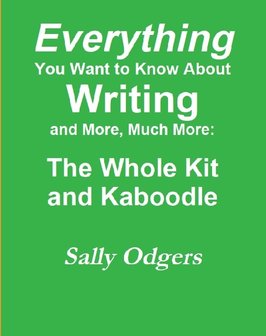
Introducing... Everything You Want to Know about Writing and More, Much More
Click on the link above to read about the BIG book Affa wrote to help you make the most of your writing talent and opportunities. "Everything" is available in a three volume set (1. Six Powerful Basics, 2. Finding Worlds in Your Words and 3. You, the Author; the Authorial Life) and also in a giant omnibus "Kit and Kaboodle" volume.
Click on the link above to read about the BIG book Affa wrote to help you make the most of your writing talent and opportunities. "Everything" is available in a three volume set (1. Six Powerful Basics, 2. Finding Worlds in Your Words and 3. You, the Author; the Authorial Life) and also in a giant omnibus "Kit and Kaboodle" volume.
| SPELLING CHALLENGE How many of the following words can you spell without looking them up? Accommodation (double c double m) Ambivalent (hmmm) Ambulant (walking) Bivouac Caricature Definite Demesne Facetious Fahrenheit Fiancé Fiancée Fluorescent Guttural Iridescent Manoeuvre Mortgage Naïve Naiveté Onomatopoeia Ophthalmologist Parallel Personnel (not the same as personal) Potpourri Precis Psychedelic Relevant Reminisce Ricochet Ventriloquist |
Affa has a new ad on YOUTUBE. Click here
AFFA's gift deal 9/5/15
Affa has been visiting her grandchildren. While she was there, her grandson requested a story about "a jet and a spider". Affa delivered a rhyming adventure called The Pilot and the Spider. Her granddaughter then asked for a story about a cat going over a wall and some flowers. Affa wrote The Kitten in the Garden. The children loved these stories and requested them again and again.
Below are the beginnings of the stories...
The jet fighter was a wonder
Of sleek and silver speed
With Ashton as the pilot
It went so fast indeed
Rainbow the kitten has a garden of her own
With a cushion in a basket to make her feel at home
As you can see, rocket-science these are not, but the children loved them because they were written to order. Now you can have stories written to order for YOUR children or grandchildren or for random kids you would like to please. Just send Affa the subject (up to three things) and the child's first name and age, and order "adventure", "cosy" or whatever, and Affa will do the rest. Affa will also include three illustrations to brighten the proceedings. The cost for this exercise is $50.00 which covers the pictures as well as the text. For a bit extra, you can have the text and pictures printed in a REAL book.
Below are the beginnings of the stories...
The jet fighter was a wonder
Of sleek and silver speed
With Ashton as the pilot
It went so fast indeed
Rainbow the kitten has a garden of her own
With a cushion in a basket to make her feel at home
As you can see, rocket-science these are not, but the children loved them because they were written to order. Now you can have stories written to order for YOUR children or grandchildren or for random kids you would like to please. Just send Affa the subject (up to three things) and the child's first name and age, and order "adventure", "cosy" or whatever, and Affa will do the rest. Affa will also include three illustrations to brighten the proceedings. The cost for this exercise is $50.00 which covers the pictures as well as the text. For a bit extra, you can have the text and pictures printed in a REAL book.
SEASON'S GREETINGS 2014
I wish you all season’s greetings, hope you had a great Christmas and that you are looking forward to the New Year with pleasure rather than panic.
I know some of you are still waiting on jobs, but I’m moving forward fairly quickly at present.
Here are some updates for those of you who are interested.
Affordable Manuscript Assessments is still at http://affordablemanuscriptassessments.com although it is at a different server from 2012.
We now have a page called Affa’s Log where you should be able to track your manuscript’s progress. This is at http://www.affordablemanuscriptassessments.com/affas-log.html
Our pricing is still $25.00 for the first 5000 words (or part thereof) for assessing and for the first 3000 words (or part thereof) for editing. After this you pay $15 per 3500 extra words for an edit and $15 per 10,000 extra words (or part thereof) for an assessment. If it is a particularly difficult job it may be a bit more. If it is a quick job (with few problems) it can sometimes be a bit less.
The new site has a self-quote page at http://www.affordablemanuscriptassessments.com/self-quote.html so you can work out how much the job is likely to be.
We run quarterly accounts but if you have difficulty paying you can ask for an extension or make a part payment.
Over the past three years, I have dealt with around 250 clients, some of you several times. Thank you all so much for your patience, good humour and (of course) payments. My family (which includes nine dogs) do appreciate this.
The longest job was around 250,000 words, and the shortest, around 200. If I am editing, short jobs (that is, under 3000 words) take me around an hour. Assessments take around the same time for short jobs, because I have to type up the assessments and often reread and cut/paste to show edits. Longer works differ a bit, so editing a 30,000 word book (say) takes longer than assessing it. Editing ideally should be done in two passes, which includes a proofing pass, but that takes about half as much time again, which obviously makes the job more expensive in terms of dollars and hours. This is why it is helpful when you tell me exactly what you want and need in a job. For example, if you are self-publishing, a second pass edit would be more necessary to avoid typos in the published version.
Occasionally the colour coding on the Affa’s Log page glitches, but it’s usually restored after a few hours. If you have any concerns, let me know.
If your job disappears there are two possible reasons; One, it’s been paid for. Two, it’s a glitch. If your job is not listed, let me know as my email synching now and then dumps an email in an obscure place. Also, I’m human and thus fallible.
Affordable Manuscript Assessments runs writing courses and sells PDF writing workshops at affordable rates.
The ebooks can be seen at http://www.affordablemanuscriptassessments.com/ebooks-and-e-courses-in-more-detail.html
We also have a six-week writing-for-children course for $50.00.
We also run one-on-one children’s book writing courses, which take students right through the process.
Finally, if you like a writing challenge you might like to visit Prints Charming Books, which is our anthology-publishing collective. We do anthologies which include advertising for writers. No one gets paid (and that includes me!) but conversely no one has to pay anything either (except for me). I think we all have a good time. http://www.printscharmingbooks.com So far, we have brought out anthologies called CHARMS and KEEPSAKES. LUCKY DRAW, PRINTS RHYMING and ZOO-THOLOGY are due out next year and LODESTONE and THE GIRL AND THE UNICORN are open for writers right now.
Thanks again to everyone who has dealt with AFFA at any point. I hope to encounter you all again in future. And a HUGE thank you to those who have sent me copies of books AFFA godmothered or who have let me know of your successes. That really warms AFFA’s middle-aged heart.
Sally Odgers for
www.affordablemanuscriptassessments.com
Manuscript assessment you can afford
Editor and compiler and head utter-nutter at Prints Charming Books
www.printscharmingbooks.com
I wish you all season’s greetings, hope you had a great Christmas and that you are looking forward to the New Year with pleasure rather than panic.
I know some of you are still waiting on jobs, but I’m moving forward fairly quickly at present.
Here are some updates for those of you who are interested.
Affordable Manuscript Assessments is still at http://affordablemanuscriptassessments.com although it is at a different server from 2012.
We now have a page called Affa’s Log where you should be able to track your manuscript’s progress. This is at http://www.affordablemanuscriptassessments.com/affas-log.html
Our pricing is still $25.00 for the first 5000 words (or part thereof) for assessing and for the first 3000 words (or part thereof) for editing. After this you pay $15 per 3500 extra words for an edit and $15 per 10,000 extra words (or part thereof) for an assessment. If it is a particularly difficult job it may be a bit more. If it is a quick job (with few problems) it can sometimes be a bit less.
The new site has a self-quote page at http://www.affordablemanuscriptassessments.com/self-quote.html so you can work out how much the job is likely to be.
We run quarterly accounts but if you have difficulty paying you can ask for an extension or make a part payment.
Over the past three years, I have dealt with around 250 clients, some of you several times. Thank you all so much for your patience, good humour and (of course) payments. My family (which includes nine dogs) do appreciate this.
The longest job was around 250,000 words, and the shortest, around 200. If I am editing, short jobs (that is, under 3000 words) take me around an hour. Assessments take around the same time for short jobs, because I have to type up the assessments and often reread and cut/paste to show edits. Longer works differ a bit, so editing a 30,000 word book (say) takes longer than assessing it. Editing ideally should be done in two passes, which includes a proofing pass, but that takes about half as much time again, which obviously makes the job more expensive in terms of dollars and hours. This is why it is helpful when you tell me exactly what you want and need in a job. For example, if you are self-publishing, a second pass edit would be more necessary to avoid typos in the published version.
Occasionally the colour coding on the Affa’s Log page glitches, but it’s usually restored after a few hours. If you have any concerns, let me know.
If your job disappears there are two possible reasons; One, it’s been paid for. Two, it’s a glitch. If your job is not listed, let me know as my email synching now and then dumps an email in an obscure place. Also, I’m human and thus fallible.
Affordable Manuscript Assessments runs writing courses and sells PDF writing workshops at affordable rates.
The ebooks can be seen at http://www.affordablemanuscriptassessments.com/ebooks-and-e-courses-in-more-detail.html
We also have a six-week writing-for-children course for $50.00.
We also run one-on-one children’s book writing courses, which take students right through the process.
Finally, if you like a writing challenge you might like to visit Prints Charming Books, which is our anthology-publishing collective. We do anthologies which include advertising for writers. No one gets paid (and that includes me!) but conversely no one has to pay anything either (except for me). I think we all have a good time. http://www.printscharmingbooks.com So far, we have brought out anthologies called CHARMS and KEEPSAKES. LUCKY DRAW, PRINTS RHYMING and ZOO-THOLOGY are due out next year and LODESTONE and THE GIRL AND THE UNICORN are open for writers right now.
Thanks again to everyone who has dealt with AFFA at any point. I hope to encounter you all again in future. And a HUGE thank you to those who have sent me copies of books AFFA godmothered or who have let me know of your successes. That really warms AFFA’s middle-aged heart.
Sally Odgers for
www.affordablemanuscriptassessments.com
Manuscript assessment you can afford
Editor and compiler and head utter-nutter at Prints Charming Books
www.printscharmingbooks.com

 RSS Feed
RSS Feed